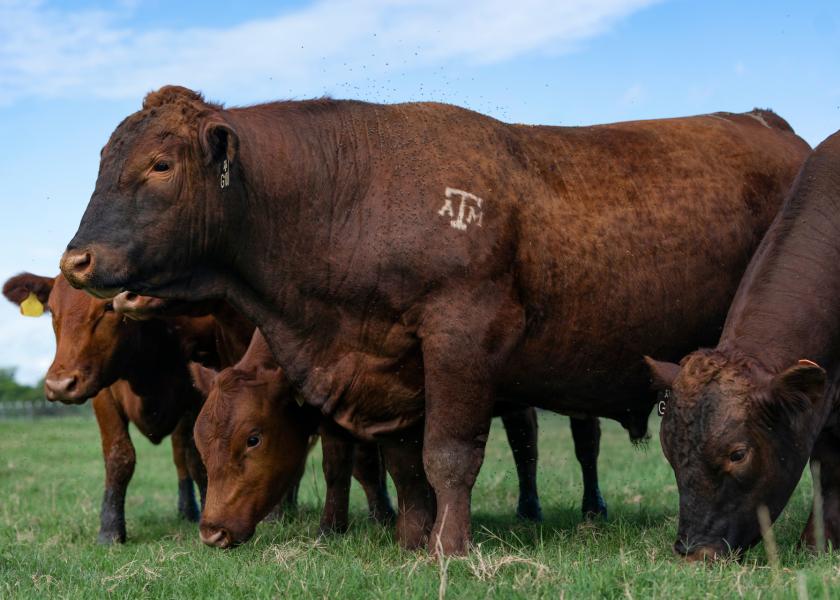Determining How Male Behaviors, Environment Affect Offspring in Livestock

Lacey Luense, Ph.D., spent the first 10 years of her career using live animal models to understand the mechanisms of the sperm epigenome and its role in human disease and development. But now, she is taking her epigenetics research program in a new direction.
Luense is getting back to her first love – agriculture – as an assistant professor in the Texas A&M College of Agriculture and Life Sciences Department of Animal Science since August 2022.
“I grew up in northwest Iowa in a rural area, and my family owns a steakhouse,” she said. “All my friends lived on farms, and I was in 4-H, so I grew up in an agricultural background. I knew from an early age that I wanted to study genetics and always thought I would go through graduate school and return to Iowa to apply my understanding of epigenetics to agricultural questions.”
But her path took her in a different direction.
She earned her bachelor’s in biology at Augustana University in Sioux Falls, South Dakota, her master’s in genetics at Iowa State University and her doctorate in molecular and integrative physiology at the University of Kansas Medical Center.
She then spent the next 10 years, first as a postdoctoral fellow and then as a research associate at the University of Pennsylvania School of Medicine.
“I ended up working with mice, which is a great system to understand better the basic mechanisms of genetics and epigenetics,” Luense said. “But I wanted to come back to the initial drive that I had while in high school and college to bring this area of study back around to answer agricultural questions.
“Texas A&M is a wonderful place to do that type of research. Obviously, the animal science program in the College of Agriculture and Life Sciences is extraordinarily strong.”
Epigenetics, going beyond DNA
The study of epigenetics identifies changes in gene function that are not due to mutations but rather how the DNA is packaged in the cell and turned on or off in the wrong conditions.
“This is often influenced by the environment, so things like diet, drugs, alcohol, heavy metals, toxicants,” she said. “All sorts of things can influence the epigenome or how our DNA is coiled in the cell and then turns genes on or off. And that all affects disease and development.”
For Luense, her research interest is with the germ line epigenome and how DNA in the sperm of cattle or humans, the paternal epigenome, can be influenced by the environment.
“We know the environment can affect the epigenome and absolutely alter how the DNA is packaged. I am extremely interested in using the basic mechanisms we are examining now and applying this knowledge to other questions such as climate change, drought, increasing temperatures or health.”
She said the current hot temperatures will continue to affect ranchers throughout the state, and her goal is to understand how these environmental stressors impact reproduction.
“These are problems Texans need to understand to help their production operations,” she said. “By understanding the basic mechanism, looking for biomarkers and understanding how this works, we can hopefully improve the fertility of bulls in the future.”
Luense said she is trying to understand how the environment can influence offspring or the early embryo. For instance, there are more long-term implications to look at, such as implantation – how does the paternal epigenetic regulate the embryo to allow it to grow normally in the uterus? Does it affect long-term health and development, and potential disease for the offspring, whether children or livestock?
Scientists have understood a mother’s influence on offspring but are becoming more aware of how epigenetics within sperm can have a strong influence. Luense is interested in a deeper understanding of how male epigenetics impact progeny.
She said one of the important things she is excited about at Texas A&M and in animal science is using these technologies and knowledge to look at larger animals.
One of her first projects will look at the epigenome and sperm of cattle to understand fertility and how it relates to embryo development, long-term health and development of the offspring.
“I’m very much interested in how epigenetics affects dad and then how that affects their children,” Luense said.
Bringing her research full circle
While she is now concentrating on livestock, Luense said an exciting avenue would be use her large animal research models to study human disease and development.
“I’m excited to have dual paths of translational value, to understand how the epigenome affects agricultural production and then utilize that for understanding human fertility and human development,” Luense said. “I would like to develop this into a research program where we can make impactful findings to multiple stakeholders on the animal production and human sides.”
She said there are similarities between bovine and human sperm and embryos, as well as more long-term development, and the discoveries in cattle can provide a better understanding of humans.
Luense will continue to use mice models in her research because they can help answer some questions quickly, but she hopes to answer more applied questions by studying cattle.
“It’s been a really nice opportunity to come full circle – my background, my training and then being able to come back and pull everything together in these different research areas,” Luense said. “We can study both agricultural questions, but then also gain an understanding of human health and disease.”
She has developed strong collaborative studies with experts at Texas A&M who have researched cattle, sheep and other animals within different production systems.
Luense is also passionate about developing the next generation of scientists as a mentor for students.
“That’s something I find really important, to mentor our students to become scientists, extension agents and teachers and to help them get the training and encouragement they need.”







